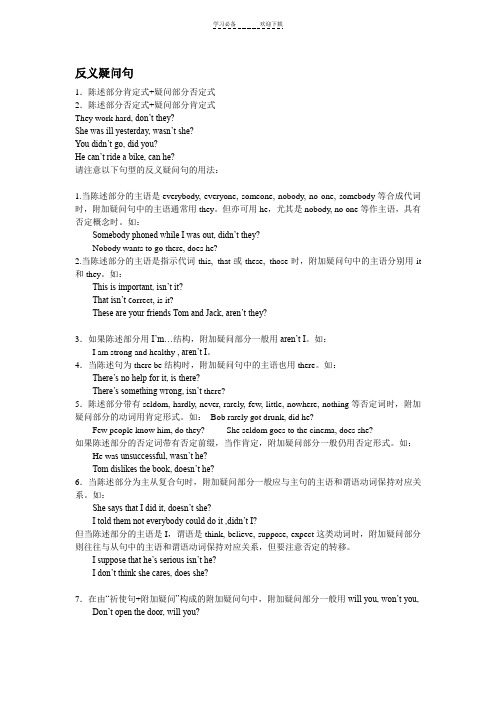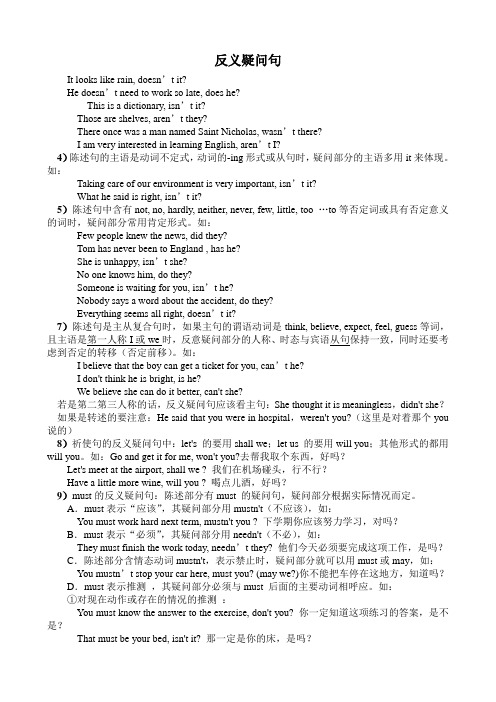史上最全最有方法的反义疑问句讲解及练习
反义疑问句详解及练习和答案

反义疑问句1.陈述部分肯定式+疑问部分否定式2.陈述部分否定式+疑问部分肯定式They work hard, don’t they?She was ill yesterday, wasn’t she?You didn’t go, did you?He can’t ride a bike, can he?请注意以下句型的反义疑问句的用法:1.当陈述部分的主语是everybody, everyone, someone, nobody, no one, somebody等合成代词时,附加疑问句中的主语通常用they。
但亦可用he,尤其是nobody, no one等作主语,具有否定概念时。
如:Somebody phoned while I was out, didn’t they?Nobody wants to go there, does he?2.当陈述部分的主语是指示代词this, that或these, those时,附加疑问句中的主语分别用it 和they。
如:This is important, isn’t it?That isn’t c orrect, is it?These are your friends Tom and Jack, aren’t they?3.如果陈述部分用I’m…结构,附加疑问部分一般用aren’t I。
如:I am strong and healthy , aren’t I。
4.当陈述句为there be结构时,附加疑问句中的主语也用there。
如:There’s no help for it, is there?There’s something wrong, isn’t there?5.陈述部分带有seldom, hardly, never, rarely, few, little, nowhere, nothing等否定词时,附加疑问部分的动词用肯定形式。
反义疑问句详细讲解及习题及答案

反义疑问句一.句型解释反义疑问句(The Disjunctive Question):即附加疑问句。
它表示提问人的看法,没有把握,需要对方证实。
反义疑问句由两部分组成:前一部分是一个陈述句,后一部分是一个简短的疑问句,两部分的人称时态应保持一致。
1.陈述部分肯定式+疑问部分否定式2.陈述部分否定式+疑问部分肯定式She was ill yesterday, wasn’t she?You didn’t go, did you?二.特殊的句型1.祈使句。
祈使句后一般加上will you或won't you构成反意疑问句,用will you 多表示“请求”,用won't you 多表示提醒对方注意。
例如:Let引导的祈使句有两种情况:1) Let's...,后的反意疑问句用shall we或shan't we。
例如:Let's go home, shall we/ shan't we? 回家吧,好吗?2)Let us/me...后的反意疑问句用will you或won't you。
例如:Let me have a try, will you/won't you?3)祈使句都用will you 或won’t you2.当陈述部分含I think (believe, suppose...)that... 结构时,其反意疑问句须与从句的主、谓语保持一致,注意主句的主语必须是第一人称。
例如:I don't think he will come, will he?若是非第一人称,则与主句的主语相一致He thinks that she will come, doesn’t he?反意疑问句的陈述部分为I(We) don’t think(believe, suppose, consider)+ that从句时,从句为否定意义,问句部分的动词和主语仍与that从句保持一致且用肯定式。
(完整版)反义疑问句讲解及答案

反义疑问句一.句型解释反义疑问句(The Disjunctive Question):即附加疑问句。
它表示提问人的看法,没有把握,需要对方证实。
反义疑问句由两部分组成:前一部分是一个陈述句,后一部分是一个简短的疑问句,两部分的人称时态应保持一致。
1.陈述部分肯定式+疑问部分否定式2.陈述部分否定式+疑问部分肯定式She was ill yesterday, wasn’t she?You didn’t go, did you?二.特殊的句型1.祈使句。
祈使句后一般加上will you或won't you构成反意疑问句,用will you 多表示“请求”,用won't you 多表示提醒对方注意。
例如:Let引导的祈使句有两种情况:1) Let's...,后的反意疑问句用shall we或shan't we。
例如:Let's go home, shall we/ shan't we? 回家吧,好吗?2)Let us/me...后的反意疑问句用will you或won't you。
例如:Let me have a try, will you/won't you?3)祈使句都用will you 或won’t you2.当陈述部分含I think (believe, suppose...)that... 结构时,其反意疑问句须与从句的主、谓语保持一致,注意主句的主语必须是第一人称。
例如:I don't think he will come, will he?若是非第一人称,则与主句的主语相一致He thinks that she will come, doesn’t he?反意疑问句的陈述部分为I(We) don’t think(believe, suppose, consider)+ that从句时,从句为否定意义,问句部分的动词和主语仍与that从句保持一致且用肯定式。
(完整版)反义疑问句讲解及答案

反义疑问句一.句型解释反义疑问句(The Disjunctive Question):即附加疑问句。
它表示提问人的看法,没有把握,需要对方证实。
反义疑问句由两部分组成:前一部分是一个陈述句,后一部分是一个简短的疑问句,两部分的人称时态应保持一致。
1.陈述部分肯定式+疑问部分否定式2.陈述部分否定式+疑问部分肯定式She was ill yesterday, wasn’t she?You didn’t go, did you?二.特殊的句型1.祈使句。
祈使句后一般加上will you或won't you构成反意疑问句,用will you 多表示“请求”,用won't you 多表示提醒对方注意。
例如:Let引导的祈使句有两种情况:1) Let's...,后的反意疑问句用shall we或shan't we。
例如:Let's go home, shall we/ shan't we? 回家吧,好吗?2)Let us/me...后的反意疑问句用will you或won't you。
例如:Let me have a try, will you/won't you?3)祈使句都用will you 或won’t you2.当陈述部分含I think (believe, suppose...)that... 结构时,其反意疑问句须与从句的主、谓语保持一致,注意主句的主语必须是第一人称。
例如:I don't think he will come, will he?若是非第一人称,则与主句的主语相一致He thinks that she will come, doesn’t he?反意疑问句的陈述部分为I(We) don’t think(believe, suppose, consider)+ that从句时,从句为否定意义,问句部分的动词和主语仍与that从句保持一致且用肯定式。
反义疑问句的用法归纳及回答举例

反义疑问句的用法归纳及回答举例
1. 哎呀呀,反义疑问句就是在陈述句后面加上一个简短问句呀!比如“你喜欢看书,不是吗?”,这里就是先陈述“你喜欢看书”,然后问“不是吗”。
2. 咱要注意哦,如果前面陈述句是肯定的,后面的反义疑问句就要用否定形式呢。
就像“他很聪明,不是吗?”。
3. 反过来,如果前面是否定陈述句,那后面的反义疑问句就得是肯定的啦!比如“她今天没来,对吧?”。
4. 回答的时候可别糊涂呀!要是同意就说“是呀”或“对呀”,不同意就直接说“不是”。
就好像人家问“今天天气不错,不是吗?”,觉得对就说“是呀”。
5. 有时还会遇到特殊情况呢,像“Let's go shopping,shall we?”这时候就得用“shall we”呀。
6. 还有那种祈使句的反义疑问句呢,“别跑太快,好吗?”就是一种呀。
7. 哎呀,这反义疑问句用法不复杂吧,一学就会啦!就像学骑自行车,掌握了技巧就没问题啦!
8. 记住这些要点,以后再遇到反义疑问句就不怕啦!反义疑问句其实挺好玩的呀,能让我们的交流更有趣不是吗?我觉得掌握反义疑问句真的很有用,能让我们的表达更丰富呢。
反义疑问句知识点详细讲解及练习

反义疑问句It looks like rain, doesn’t it?He doesn’t need to work so late, does he?This is a dictionary, isn’t it?Those are shelves, aren’t they?There once was a man named Saint Nicholas, wasn’t there?I am very interested in learning English, aren’t I?4)陈述句的主语是动词不定式,动词的-ing形式或从句时,疑问部分的主语多用it来体现。
如:Taking care of our environment is very important, isn’t it?What he said is right, isn’t it?5)陈述句中含有not, no, hardly, neither, never, few, little, too …to等否定词或具有否定意义的词时,疑问部分常用肯定形式。
如:Few people knew the news, did they?Tom has never been to England , has he?She is unhappy, isn’t she?No one knows him, do they?Someone is waiting for you, isn’t he?Nobody says a word about the accident, do they?Everything seems all right, doesn’t it?7)陈述句是主从复合句时,如果主句的谓语动词是think, believe, expect, feel, guess等词,且主语是第一人称I或we时,反意疑问部分的人称、时态与宾语从句保持一致,同时还要考虑到否定的转移(否定前移)。
反义疑问句讲解以及练习题

反义疑问句讲解:一:基本知识(1)什么是反义疑问句?举个例子。
(2)结构:“肯定陈述+否定疑问”或“否定陈述+肯定疑问”(前肯后否or前否后肯)(3)两部分时态、人称应一致(人称需要用主格)。
She was ill yesterday, wasn’t she? You didn’t go, did you?(4)简略问句如果是否定式,not应与be,do,will等系动词、助动词、情态动词缩写,不能出现not。
(5)简略问句的主语不用名词,应用人称代词,不能出现名词。
*练习:写出下列句子的反义疑问句:1.It looks like rain, ________________________?2.He doesn’t need to work so late,_____________________?3. She felt so bad yesterday ,______________________?4. Mr.Li will go to Paris,__________________________?二:知识升华(6) everything,anything,nothing,something时,附加疑问句中主语用it 不用they(7)this,that,或those,these时,附加疑问句中主语用it和they.(8)在there be句型中,附加疑问句中主语一般用be/情态动词/助动词+there(9)陈述句中含有not, no, hardly, neither, never, few, little, too…to等否定词或具有否定意义的词时,疑问部分常用肯定形式。
如:(10)如果主语是l’m,后反意部分用aren’t l(11)对反意疑问句的回答,是根据事实,而不是根据问题的提法。
He isn‘t a doctor, is he ? (他不是医生,是吗?)Yes,_____________________. He ___________(is/isn’t) a doctor.No, _________________________. He ______________(is/isn’t) a doctor.*练习:写出下列句子的反义疑问句:1. Nothing happened last night,__________________________?2. This is what I want ,____________________?3. Those are my pens, ____________________?4. There is something gone,__________________?5. There will be a meeting tomorrow,___________________?6. There seems to be some new books,___________________?7. Few people knew the news, _________________?8. Tom has never been to England,_________________________?9. l’ m late , _________________________?10.---Mary likes drawing, doesn’t she?---_____, she____________. She draws pictures every day!三、表示主语主观意愿的词含有think, believe, suppose, imagine, expect等动词后接宾语从句构成的主从复合句在构成反意疑问句时,视情况不同有两种不同的构成方式。
反义疑问句的用法归纳及习题

反义疑问句的用法归纳及习题反义疑问句是英语语法中的常用句型之一,它由一个肯定或否定的陈述句和一个所加的疑问句构成。
通过反义疑问句的使用,我们可以在表达思想观点时增强语气,提出问题的同时向对方确认自己的观点。
本文将介绍反义疑问句的用法,并提供相应的习题供读者进行练习。
一、反义疑问句的构成反义疑问句由两个部分组成:一个陈述句和一个疑问句。
陈述句通常是一个完整的句子,而疑问句则是一个简化的疑问句。
1. 如果陈述句是肯定句,则疑问句部分用否定形式;例如:- They are from China, aren't they?- You can swim, can't you?2. 如果陈述句是否定句,则疑问句部分用肯定形式;例如:- He doesn't like coffee, does he?- They haven't arrived yet, have they?二、反义疑问句的用法1. 确认对方的观点或陈述:当说话人对对方的陈述持怀疑态度时,可以使用反义疑问句来进行确认。
例如:- You haven't seen the movie, have you?- You don't like ice cream, do you?2. 请求对方的帮助或征求对方的意见:当说话人需要对方给予回应或意见时,可以使用反义疑问句来婉转地提出请求。
例如:- It's a beautiful day, isn't it? (期待对方赞同这个说法)- This problem is difficult, isn't it? (希望对方给予帮助或建议)3. 表达自己的观点或感受:反义疑问句也可以用来表达自己的观点或感受,并期待对方与自己保持一致或不一致。
例如:- She is a talented singer, isn't she?- You're not feeling well, are you?三、习题练习以下是一些习题,供读者练习反义疑问句的用法。
- 1、下载文档前请自行甄别文档内容的完整性,平台不提供额外的编辑、内容补充、找答案等附加服务。
- 2、"仅部分预览"的文档,不可在线预览部分如存在完整性等问题,可反馈申请退款(可完整预览的文档不适用该条件!)。
- 3、如文档侵犯您的权益,请联系客服反馈,我们会尽快为您处理(人工客服工作时间:9:00-18:30)。
反义疑问句1、反意疑问句的前半句是陈述句,当然是按老惯例用降调。
而后半句是简短问句,当然就用升调了。
不过有时说话人对陈述部分把握较大,只是象征性地征求一下意见,这后半部分就得用降调了。
It's very cold today, ↘isn't it? ↘ (说话时天气确实很冷。
)You're from England, ↘aren't you?↗ (说话时,对对方是否来自England,把握不大。
)2、现在你已知道怎样向别人说这个带尾巴的句子了。
反过来,要是别人问你:It's very cold today, isn't it? 你该怎么回答呢?反意疑问句的回答法跟一般疑问句的回答方式完全一样。
例如:She is good at English, isn't she?回答可以是:Yes, she is. 或者No, she isn't. 注意,回答一定要和实际情况相符合,“是”就“是”,“不是”就“不是”。
也就是说回答反意疑问句要遵循“实事求是”的原则,肯定的答案就用yes+肯定结构;否定的答案就用no+否定结构。
答案要和实际情况相符。
那怎样回答There is a computer in your room, isn't there? 这个句子呢?你房间里确实有台电脑,那么回答就是:Yes, there is.3、不过,我们现在只练习了一种反意疑问句,即:前一部分为肯定式,后一部分是否定式。
There isn't a computer in your room, is there?“你的房间里没有电脑,对吗?”你该怎么回答呢?根据中国人的思维,反应在你脑海中的肯定是,“不对,我房间里有电脑。
” 便顺口回答道:No, there is. 这样,可就大错特错了。
因为你违背了“事实求是”的原则:肯定的答案就用yes+肯定结构;否定的答案就用no+否定结构。
所以刚刚那句话的回答应该是:Yes, there is.4、总之,回答反意疑问句就得记住一点:实事求是。
记住了?不管是做人还是回答反意疑问句都是一样的。
OK. You don't have any questions, do you? 你怎么回答呢?希望是--No, I don't.5、针对祈使句也一样,无论是否带有否定,都按照你有没有要不要做这件事回答。
如:Let's meet at the airport, shall we ?或者是Let's don't meet at the airport, shall we ?都是回答YES,we shall.(是的,在机场碰面)或者是NO,WE SHALL NOT(不,不在机场碰面)6、奇葩1)当陈述部分的主语是I , everyone, everything, nobody 时,后面的疑问句应表示为:I am a student, aren’t IEveryone is in the classroom, aren’t they?Everything begins to grow in spring, doesn’t it?Nobody will go, will they?2)当陈述部分有never,seldom, hardly,few,little,barely, scarcely, nothing 等否定词时,后面的疑问句则表示为:There are few apples in the basket, are there?He can hardly swim, can he?They seldom come late, do they?否定前缀不能视为否定词,其反意疑问句仍用否定形式。
It is impossible, isn't itHe is not unkind to his classmates, is he3)当陈述部分是I think , believe, expect, suppose, imagine+从句时,疑问句应和从句的人称时态保持一致。
I think chickens can swim, can’t they?I think Lucy is a good girl, isn’t she?I didn't think he was happy, was he?We believe she can do it better, can't she?4)陈述部分有had better 时,疑问句应用hadn’t开头:you’d better get up early, hadn’t you?5)感叹句中,疑问部分用be +主语。
What colours, aren't they ?What a smell, isn't it ?一、练习:1.Linda ate nothing this morning, ___?A. didn’t sheB. was sheC. did sheD. wasn’t she2. There’s hardly___ milk in the bottle, _____there?A. no, isn’tB. some, isC. little, isn’tD. any, is3. He has never ridden a horse before, ___?A. does heB. has heC. hasn’t heD. doesn’t he4. — He seldom came here, _____?— Yes sir.A. didn’t heB. does heC. doesn’t heD. did he5. Everything seems all right, _____ ?A. does itB. don’t theyC. won’t itD. doesn’t it7. One can’t be too modest, can _____ ?A. oneB. heC. itD. we8. No one failed in the exam, _____ ?A. was heB. did oneC. did theyD. didn’t he10. Neither you nor I am a artist, _____ ?A. am IB. aren’t weC. are weD. am n’t I11. He can’t be her father, _____ he?A. isB. isn’tC. canD. can’t12. They have no time to visit the museum, _____?A. do theyB. haven’t theyC. don’t theyD. will they14. You’d better go at once, _____ you?A. hadn’tB. didC. didn’tD. don’t15. You’d rather work than play, _____ you?A. hadn’tB. wouldn’tC. didn’tD. mustn’t二、再来一次:16. You dare not do that, _____ you?A. don’tB. doC. dareD. daren’t18. He dislikes the two subjects, _____ he?A. doesB. doesn’tC. isD. isn’t19. These tools are useless now, _____ ?A. are theyB. aren’t theyC. is itD. isn’t it20. He used to get up at 6:30, _____ he?A. didn’t heB. did heC. used heD. wouldn’t he22. He ought to win the first prize, _______ he?A. mustn’tB. oughtn’tC. shouldn’tD. Both B and C.23. Let’s go there by bus, ___?A. will youB. shall weC. don’t youD. will you24. Let us go to play football, ___?A. will youB. shall weC. do weD. are we25. Don’t forget to give Polly some food and change her water, ___?三、最后一练:A. will youB. shall weC. won’t youD. do you26. —Let’s go shopping this afternoon, _____?— All right.A. will weB. shall weC. don’t weD. are we27. — Pass me the dictionary, _____?— Yes, with pleasure.A. would youB. will youC. won’t youD. wouldn’t you30. There is little water in the glass, ____?A. isn’t thereB. isn’t itC. is itD. is there32. The re won’t be any concert this Saturday evening, _____ ?A. will there notB. will thereC. is thereD. won’t33. — I guess she taught herself Japanese, ______?— Yes.A. don’t IB. did sheC. do ID. didn’t she34. I don’t believe you ar e right, _____ ?A. are youB. do youC. won’t youD. do35. She doesn’t think that Tom sings best in the class, _____ ?A. does sheB. doesn’t sheC. does heD. doesn’t he37. I know you didn’t want to hurt me, _____ ?A. did youB. did n’t youC. do ID. don’t I38. If my father were here he would be very happy, _____ ?A. weren’t heB. were heC. wouldn’t heD. would heKey: 1—5 CDBDD 6—10 BACDC 11—15 AABAB 16—20 CCBBA 21—25CDBAA 26—30 BBBAD 31—35 BBDAA 36—38 AAC。
